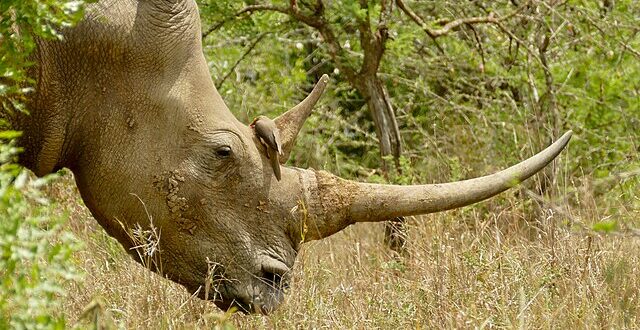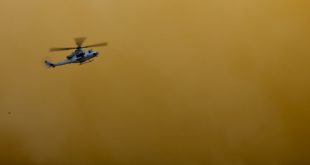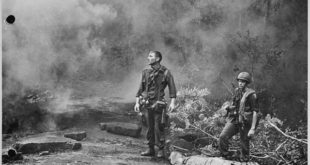The world of anti-poaching is difficult and dangerous. Especially when you come face to face with an enraged rhinoceros.
by S. Anderson
I’ve always been fascinated by the African Bush. Lions, Leopards, Cape Buffalo, Elephant, and Rhino. The Big 5. Endless rolling hills, dense bush, and undisturbed ecology. Growing up, my local comparison from rural Ontario would be tomcats, cows, squirrels, and pigs; land as flat as piss-on-a-plate, corn fields, and anally planned acres. So when I got the opportunity to say ‘nuts’ to school, and participate in Anti-Poaching efforts in South Africa, I jumped at the opportunity.
The world of Anti-Poaching is tough. Unending patrols over mountains and through bush so dense it feels as if you are drowning. Weeks in the field with little food, less water, and as little equipment as you can get by on to still be effective. Comfort items are the first pieces of kit jettisoned. It takes a toll. Even without the threat of poachers, living in the bush and patrolling is difficult and dangerous. I loved it.
While we were in the field, we juggled a couple of different operations taking place at private game reserves, farms, and mining concessions. Our team would cycle between them based on what was happening in each location. On one particular day, our team was assisting the ecology department of a private game reserve.
An elephant had at some point lost one of its tusks, and we were called out to go find it.
When elephants lose a tusk (which happens fairly frequently with old ones) they can’t legally be sold. Typically, if they are found by the park, which they usually are as most parks use tracking technology on their herds, they often are stored in a vault.
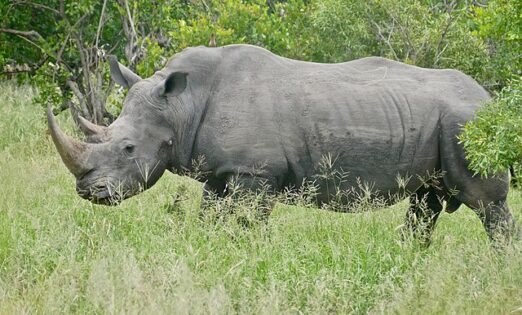
If word got out to the local shebeens about the missing ivory before it was recovered, there could be trouble. If poachers hear about something like that in a park, they will enter and sweep through looking for it. Ivory isn’t as expensive as rhino horn, but it is close. Foreigners, typically from Mozambique or Zimbabwe either come over themselves, or recruit people from nearby towns to help them. Once they get what they want, whether it be bush meat, illegal wood, or rhino, they bring it back and it gets pushed out to the market.
Even outside of a syndicate (our main concern), the local towns are incredibly impoverished, and the prospect of making enough money off of getting one horn can be very enticing.
Each park is run to a different standard. The one we were at hadn’t had an animal poached in over a decade because of how much time they put into vetting staff, and patrolling until any item of value is found. Basically, it’s critical that the local people knew we were there and searching. Otherwise they’d start trying to get through the fence.
It was imperative that it was found, as despite this particular reserve having a near impeccable reputation (their head of security demanded incredibly high standards – and ran an equally tight ship), any lapse in OpSec from any employee who heard about it would be sure to draw the attention of the poaching syndicate in the area. Loose lips sink ships.
This should be an easy job. The trouble was that elephants travel in loose herds and cover about a dozen kilometers a day through the dense bush. Less Easy. It had been a couple days and many hills before the missing horn had been noticed and reported. Shit.
Our team was made up of 12 guys, operating in three-four man sticks depending on the mission. We had nine rookies and three experienced trackers. Their tracking ability was magician-like to us at times. This was now our third day looking for ivory, and we had been living in a boma (hastily constructed fort made out of weaving thorn bushes together to keep dangerous game out) and rationing water.
For anyone who hasn’t rationed water before while on a multi-day long patrol, it sucks. It double sucks when in the stark African sun. The dehydration, compounded by the injuries and ailments that were starting to catch up to the guys, caused moments of confusion, trouble focusing, and poor decision making skills.
For the ivory patrols, my stick consisted of myself; my buddy Andrew, a good-natured American with a genuine passion for animals; and Mike, a South African who did search and rescue for fun and was doing anti-poaching to get better at tracking. He was a bit older than us and cool as hell.
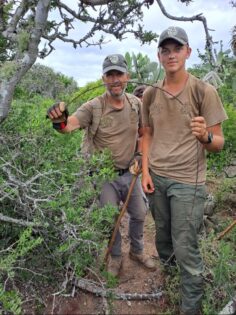
The “Old Man,” left, and S. Anderson.
As our land cruiser came to a halt at the very edge of the reserve along the fence, we hopped out the back and started fanning out.
Zzz-CRACK!
“What’s that weird noise— Holy Shit! Fuck!” I thought to myself whilst getting zapped by a 10,000 volt electric fence designed to keep the world’s largest megafauna from escaping the confines of the game reserve. It zapped me in the leg just above where my boot cut off. Holy Hell that hurt.
I didn’t make a noise because my jaw luckily clenched up when I got shocked, as the wave traveled up my body contracting every muscle. It didn’t really hurt like “ouch,” it hurt in an invasive way, similar to how I’d imagine a prostate exam probably feels.
The boss looked back to see who got shocked. I kept my embarrassment to myself. While not the best way to start the day, getting zapped will wake you up a hell of a lot faster than any cup of coffee.
So we fan out at the precipice of the valley. One stick on the right bank, one in the valley, and mine on the left bank to do a sweep to the end of the valley, with an RV at the top of the bowl at the end. The experienced trackers were in the rear following more specific and likely spoor.
Elephants are easy to track. They use their tusks to rip up roots, and their size to knock down trees. When the herd feels safe and is grazing, tracking them is about as difficult as following a tornado.
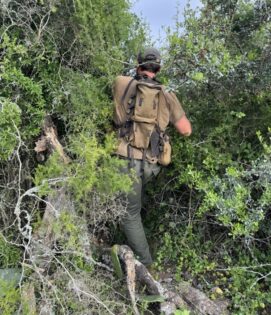
Being the third day of looking for the ivory, the novelty had worn off. We had all tracked much more difficult spoor by this point, and allowed ourselves to go into autopilot. Thoughts of distant girlfriends, big steaks, and the impending bar crawl through Cape Town were taking precedence over keeping our senses tuned into what could be lurking in the bushes. Complacency kills.
As we swept further and further into the valley, our sticks got more separated, and we would often go a couple of minutes between spotting another stick when the bush was most dense. We noticed that it had been too long since we saw another stick – and, comms being spotty, my stick cut down the valley and picked up the spoor of the middle stick and started following it.
In our frankly complacent and disheveled state, Andrew and I followed behind Mike. Nearing the end of the valley, if we were paying attention before, we definitely weren’t anymore. The end was in sight, and our patrol was close to being done for the day. Just a hop up to the top, follow the game viewer track back to the truck, and back to the boma for dinner and a nap. Sublime.
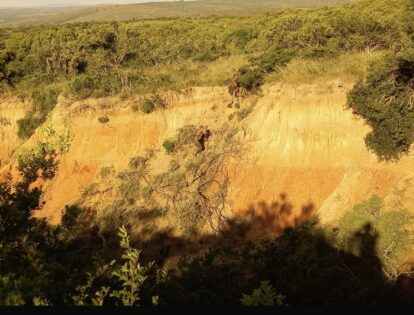
As we are continuing on our way, we round a large bush, and Mike stops. Andrew is the next around the bush. He stops and I can see him tense up. I noticed that the hair on the back of his neck was standing up like a cat. I follow him around the bush and see it. A three foot long horn with the sharp tip glinting in the sun. I make eye contact. Not more than 8 metres away, it is a Rhino. Fuck.
The abruptness and awkwardness of the situation felt similar to that of walking in on someone who forgot to lock the door of a porta-john. We are locked in a stare as we both size each other up, deciding what to do next. It is at this moment I realize that rhinos have the most majestic big brown eyes. Movement breaks the staring contest. I see the ass of a calf take off in a run. The realization hits me: That is not just a rhino, it is a mother rhino, and we spooked her kid. Double Fuck.
My brain races through a terrain assessment. Wind is swirling around the bowl. This can work for or against our favour. There is no hard cover like strong trees to hide behind, but there is dense enough bush to disguise ourselves. Once again, this fact can work for or against us as we also will not be able to see where the rhino goes. This is a mother rhino with a spooked calf. There will be no false charge or backing down. She wants to gore us.
As I do my terrain assessment, my body carries out the actions on contact-with-rhino drill. Andrew and I jockey off of our position and take a knee to conceal ourselves behind the bushes.
She charges. Straight through where we stood a second before, she made her path. A single second more of hesitation would have been goodnight for us.
“Us?” I think to myself, “Where are the others that make up the colloquial us?”
I look to the right and see Andrew. Good. I do not see Mike. Not Good. I telepathically send Andrew, “Where the fuck is Mike?!”
Andrew shrugs. He doesn’t know.
The situation now is that we aren’t sure where exactly the rhino is; just that it is pissed off. We are in dense bush, but can’t make a sound, and have to stay as down-wind as possible to where we think the rhino might be, and we have to find Mike without calling out to him.
We start walking in the general direction of where Mike likely went, and pick up his spoor while staying absolutely tuned up keeping in mind avoiding the rhino. It is the most incredible use of the five senses, and the amount of awareness feels like being on another plane of consciousness; separate and above the unaware and benign academic setting where I spend most of my time back in Canada. It was akin to unlocking another part of the brain I did not know existed.
Following the spoor for a couple seconds, we look up and see Mike. He is totally chilled out. Completely cool with what’s going on. We gesture over to him and make a beeline up to the top.
Not saying a word until we were safely back on an open road far away from the rhino and any other animal, we burst out laughing. We were a pack of hyenas. Walking back to the truck we regaled each other with our perspectives on what we just did.
I treated myself to an extra sip of water that I typically would have saved. It had been a hell of a patrol, and I felt I deserved it.
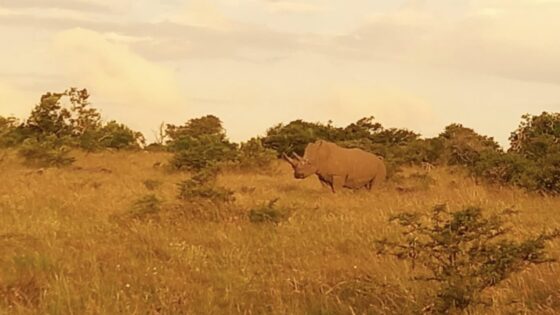
A much gentler encounter with a rather congenial rhino.
In the end, the tusk was found by the reserve’s ecology department. We mapped out and created an overlay on an aerial map of all the areas we covered. From there the ecology department did spot checks through likely areas that we didn’t have time to check. Besides, we covered vast swaths of the route and narrowed it down to just a couple locations.
Finding ivory wasn’t our primary role or focus – just something that we do well. There were cases to build and poachers to catch elsewhere.
Overall, my team spent close to a month in the bush on various operations. We tore down more than 425 snares, manned Observation Posts for days at a time, tracked poachers, passed off intelligence that we gathered to local law enforcement, and made our presence known in the local communities. When we weren’t clearing snares and building cases against poachers, we would keep our skills sharp by tracking Big 5 animals through the bush – which led to many more awkward and interesting run-ins.
S. Anderson is just beginning his journey as a professional adventurer. This is an excerpt from his time in the anti-poaching world. Always looking for the next adventure, this is his first article.
 Soldier of Fortune Magazine The Journal of Professional Adventurers
Soldier of Fortune Magazine The Journal of Professional Adventurers


